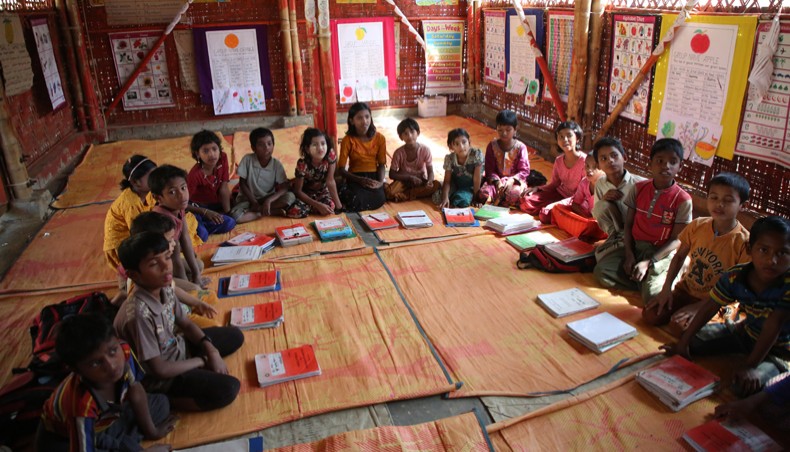Rohingya children to get education, skills training in camps UN welcomes
The Bangladesh government— under the growing pressure from the UN organisations and international rights groups—has agreed to extend education and skills training facilities to forcibly-displaced Rohingya children of Myanmar, now staying in makeshift camps in Bangladesh.
‘The government has felt the need to keep Rohingya children’s hope for future alive with extending education and skills training facilities to them,’ foreign secretary Masud Bin Momen told New Age on Monday.
The Rohingya children below the age of 14 would get education up to grade 9 and the children above that age would get skills training in the Myanmar language, he said.
He also mentioned that they would get education neither in the Bangla language nor following the national curriculum of Bangladesh.
Under a pilot project, the UNICEF and the Bangladesh government would start education and skills training facilities for over 10,000 children.
Children of Bangladeshi families in areas adjacent to Rohingya camps would also be brought under the programme, but they would be taught following the national curriculum.
The government was initially unwilling to extend education and skills training facilities for the Rohingya children though the UN organisations and international rights groups were demanding such facilities inside the camps for long.
UN resident coordinator Mia Seppo welcomed the move.
‘We welcome the decision,’ she told New Age over phone Monday evening, ‘This will prepare Rohingya children for future, especially after their return to Rakhine.’
The UN would extend all cooperation in creating education and skills training facilities for the children of the local host and the Rohingya communities, she said.
The National Taskforce on the Rohingya repatriation discussed about the need of education and skills training facilities, with the foreign secretary in the chair.
The UN officials said at the meeting that the repatriation of Rohingya people would be included as a major strategic objective of the Joint Response Plan 2020.
The next plan will also include temporary relocation of a section of the Rohingya people to Bhasanchar island from the camps in Cox’s Bazar.
A $ 877 million plan is expected to be finalised for 2020 by multiple international actors by this March with a diminishing trend in the fund compared to the two previous response plans.
The UN agencies received about $ 620 million as humanitarian support from the international community so far this year, 67 per cent of the total commitment of $ 920 million under the 2019 response plan steered by the UN, UNHCR and IOM to deliver protection, provide life-saving assistance and foster social cohesion.
‘Challenges remain,’ according to the mid-term report of the 2019 response plan as the forcibly displaced Rohingya people ‘are still dependent on aid and uncertain about their futures’.
The UN agencies had received about 70 per cent of the total commitment of $ 952 million under the 2018 response plan.
More than 7 lakh Rohingyas, mostly women, children and aged people, entered Bangladesh after fleeing unbridled murder, arson and rape during ‘security operations’ by the Myanmar military in Rakhine, what the United Nations denounced as ethnic cleansing and genocide, beginning from August 25, 2017.
The ongoing Rohingya influx has raised the number of undocumented Myanmar nationals and registered refugees from that country in Bangladesh to above a million and a lakh, according to estimates by UN agencies and Bangladesh foreign ministry.
Not a single Rohingya person returned to Rakhine even after the two countries signed three agreements to facilitate the repatriation process under the UN supervision.
News Courtesy: www.newagebd.net











